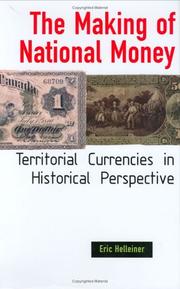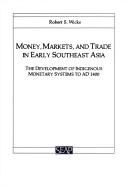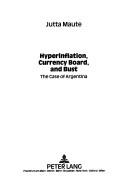| Listing 1 - 9 of 9 |
Sort by
|
Book
ISBN: 9004383093 9004372466 Year: 2018 Publisher: Brill
Abstract | Keywords | Export | Availability | Bookmark
 Loading...
Loading...Choose an application
- Reference Manager
- EndNote
- RefWorks (Direct export to RefWorks)
Reading Medieval Sources is an exciting new series which leads scholars and students into some of the most challenging and rewarding sources from the European Middle Ages, and introduces the most important approaches to understanding them. Written by an international team of twelve leading scholars, this volume Money and Coinage in the Middle Ages presents a set of fresh and insightful perspectives that demonstrate the rich potential of this source material to all scholars of medieval history and culture. It includes coverage of major developments in monetary history, set into their economic and political context, as well as innovative and interdisciplinary perspectives that address money and coinage in relation to archaeology, anthropology and medieval literature. Contributors are Nanouschka Myrberg Burström, Elizabeth Edwards, Gaspar Feliu, Anna Gannon, Richard Kelleher, Bill Maurer, Nick Mayhew, Rory Naismith, Philipp Robinson Rössner, Alessia Rovelli, Lucia Travaini, and Andrew Woods.
Money --- Numismatics --- Economic history --- Commerce --- History --- Archaeology --- Auxiliary sciences of history --- History, Ancient --- Currency --- Monetary question --- Money, Primitive --- Specie --- Standard of value --- Exchange --- Finance --- Value --- Banks and banking --- Coinage --- Currency question --- Gold --- Silver --- Silver question --- Wealth

ISBN: 1501720724 9781501720727 0801440491 9780801440496 Year: 2018 Publisher: Ithaca, NY : Cornell University Press,
Abstract | Keywords | Export | Availability | Bookmark
 Loading...
Loading...Choose an application
- Reference Manager
- EndNote
- RefWorks (Direct export to RefWorks)
Why should each country have its own exclusive currency? Eric Helleiner offers a fascinating and unique perspective on this question in his accessible history of the origins of national money. Our contemporary understandings of national currency are, Helleiner shows, surprisingly recent. Based on standardized technologies of production and extraction, territorially exclusive national currencies emerged for the first time only during the nineteenth century. This major change involved a narrow definition of legal tender and the exclusion of tokens of value issued outside the national territory. "Territorial currencies" rapidly became bound up with the rise of national markets, and money reflected basic questions of national identity and self-presentation: In what way should money be managed to serve national goals? Whose pictures should go on the banknotes? Helleiner draws out the potent implications of this largely unknown history for today's context. Territorial currencies face challenges from many monetary innovations-the creation of the euro, dollarization, the spread of local currencies, and the prospect of privately issued electronic currencies. While these challenges are dramatic, the author argues that their significance should not be overstated. Even in their short historical life, territorial currencies have never been as dominant as conventional wisdom suggests. The future of this kind of currency, Helleiner contends, depends on political struggles across the globe, struggles that echo those at the birth of national money.
Currency question. --- Money --- Money. --- Currency --- Monetary question --- Money, Primitive --- Specie --- Standard of value --- Exchange --- Finance --- Value --- Banks and banking --- Coinage --- Currency question --- Gold --- Silver --- Silver question --- Wealth --- Fiat money --- Free coinage --- Scrip --- Currency crises --- Finance, Public --- Legal tender --- Political aspects.

ISBN: 1501719475 9781501719479 0877277109 9780877277101 Year: 2018 Publisher: Ithaca, NY : Cornell University Press,
Abstract | Keywords | Export | Availability | Bookmark
 Loading...
Loading...Choose an application
- Reference Manager
- EndNote
- RefWorks (Direct export to RefWorks)
This substantial work explores the impact of monetization in premodern Southeast Asia from the third century BCE to the rise of Maleka in the early fifteenth century. The author explores why concepts of money developed unevenly throughout the region. He considers trade policies, price controls, exchange ratios, monopolies, variant standards of value, and the administrative structures required to support such a complex economic innovation.
Indigenous peoples --- Money --- Aboriginal peoples --- Aborigines --- Adivasis --- Indigenous populations --- Native peoples --- Native races --- Ethnology --- Currency --- Monetary question --- Money, Primitive --- Specie --- Standard of value --- Exchange --- Finance --- Value --- Banks and banking --- Coinage --- Currency question --- Gold --- Silver --- Silver question --- Wealth --- History. --- Southeast Asia --- Asia, Southeast --- Asia, Southeastern --- South East Asia --- Southeastern Asia --- Commerce

ISBN: 363155608X 0820487082 3631754477 9783631754474 Year: 2018 Publisher: Bern Peter Lang International Academic Publishing Group
Abstract | Keywords | Export | Availability | Bookmark
 Loading...
Loading...Choose an application
- Reference Manager
- EndNote
- RefWorks (Direct export to RefWorks)
This book focuses on «Convertibilidad», the latest Argentine experience of exchange rate based stabilisation, and aims at isolating the main causes for its tragic collapse in 2001-2002. The characteristics of Argentina’s high and hyperinflation during the 1980s are analysed, and the theory of currency boards is expounded. The stabilisation tool, an institutionally highly credible currency board arrangement (CBA), though highly effective, could not be an optimal long-term solution, given the country’s structural and trade characteristics. The analysis of the causes of the CBA’s collapse yields a complex picture of interacting factors, among them invaliding ones that had created multiple vulnerabilities over years, and triggering ones that unfolded their worst potential in meeting such vulnerable conditions.
Currency boards --- -Monetary policy --- -Currency question --- -332.410982 --- Fiat money --- Free coinage --- Monetary question --- Scrip --- Currency crises --- Finance --- Finance, Public --- Legal tender --- Money --- Monetary management --- Economic policy --- Money supply --- Financial institutions --- Monetary policy --- Argentina --- Argentina. --- Argentine Currency Board --- Argentine Republic. --- Monetary economics --- Development economics & emerging economies --- Environmental economics --- Political economy --- Currency question --- Argentinien --- Board --- Bust --- Case --- Currency --- Currency Board --- Fixed Exchange Rates --- Geschichte 1980-2002 --- Hyperinflation --- IMF --- Inflation --- IWF --- Konvertierbarkeit --- Maute --- Währung --- Washington Consensus --- Wechselkurs
Book
ISBN: 981482870X 9814841129 9789814841122 9789814828703 Year: 2018 Publisher: Singapore : Marshall Cavendish Business,
Abstract | Keywords | Export | Availability | Bookmark
 Loading...
Loading...Choose an application
- Reference Manager
- EndNote
- RefWorks (Direct export to RefWorks)
Assassins --- Electronic funds transfers --- Money --- E-books --- Currency --- Monetary question --- Money, Primitive --- Specie --- Standard of value --- Exchange --- Finance --- Value --- Banks and banking --- Coinage --- Currency question --- Gold --- Silver --- Silver question --- Wealth --- EFT (Electronic funds transfers) --- Electronic banking --- Electronic check clearing --- Electronic money systems --- Electronic payments systems --- Electronic transfer of funds --- Funds, Electronic transfers of --- Telebanking --- Transfers of funds, Electronic --- Electronic data interchange --- Electronic benefits transfers --- Home banking services
Book
ISBN: 3839445272 9783839445273 9783837645279 3837645274 Year: 2018 Publisher: Bielefeld
Abstract | Keywords | Export | Availability | Bookmark
 Loading...
Loading...Choose an application
- Reference Manager
- EndNote
- RefWorks (Direct export to RefWorks)
The relationship between economy, finance and society has become opaque. Quantum leaps in complexity and scale have turned this deeply interdependent web of relations into an area of incomprehensible abstraction. And while the economization of life has come under widespread critique, inquiry into the political potential of representational praxis is more crucial than ever. This volume explores ethical, aesthetic and ideological dimensions of economic representation, redressing essential questions: What are the roles of mass and new media? How do the arts contribute to critical discourse on the global techno-economic complex? Collectively, the contributions bring theoretical debate and artistic intervention into a rich exchange that includes but also exceeds the conventions of academic scholarship.
Money. --- Finance --- Funding --- Funds --- Economics --- Currency question --- Currency --- Monetary question --- Money, Primitive --- Specie --- Standard of value --- Exchange --- Value --- Banks and banking --- Coinage --- Gold --- Silver --- Silver question --- Wealth --- Social aspects. --- E-books --- Economy; Techno-Economy; Finance; Media Representation; Mass Media; New Media; Culture; Media; Cultural Studies; Media Aesthetics; Media Art; Cultural History --- Cultural History. --- Cultural Studies. --- Culture. --- Finance. --- Mass Media. --- Media Aesthetics. --- Media Art. --- Media Representation. --- Media. --- New Media. --- Techno-Economy.
Book
ISBN: 1501716883 1501716905 9781501716898 1501716891 9781501716904 9781501716874 1501716875 9781501716874 9781501716881 Year: 2018 Publisher: Ithaca [New York]
Abstract | Keywords | Export | Availability | Bookmark
 Loading...
Loading...Choose an application
- Reference Manager
- EndNote
- RefWorks (Direct export to RefWorks)
In Vietnam, international remittances from the Vietnamese diaspora are quantitatively significant and contribute important economic inputs. Yet beyond capital transfer, these diasporic remittance economies offer insight into an unfolding transformation of Vietnamese society through the extension of imaginations and ontological possibilities that accompany them. Currencies of Imagination examines the complex role of remittances as money and as gifts that flow across, and mediate between, transnational kinship networks dispersed by exile and migration.Long distance international gift exchanges and channels in a neoliberal political economy juxtapose the increasing cross-border mobility of remittance financial flows against the relative confines of state bounded bodies. In this contradiction Ivan V. Small reveals a creative space for emergent imaginaries that disrupt local structures and scales of desire, labor and expectation. Furthermore, the particular characteristics of remittance channels and mediums in a global economy, including transnational mobility and exchangeable value, affect and reflect the relations, aspirations, and orientations of the exchange participants. Small traces a genealogy of how this phenomenon has shifted through changing remittance forms and transfer infrastructures, from material and black market to formal bank and money services. Transformations in the affective and institutional relations among givers, receivers, and remittance facilitators accompany each of these shifts, illustrating that the socio-cultural work of remittances extends far beyond the formal economic realm they are usually consigned to.
Transnationalism --- Families --- Money --- Immigrants --- Emigrant remittances --- Vietnamese --- Annamese --- Ethnology --- Trans-nationalism --- Transnational migration --- International relations --- Currency --- Monetary question --- Money, Primitive --- Specie --- Standard of value --- Exchange --- Finance --- Value --- Banks and banking --- Coinage --- Currency question --- Gold --- Silver --- Silver question --- Wealth --- Emigrants --- Foreign-born population --- Foreign population --- Foreigners --- Migrants --- Persons --- Aliens --- Family --- Family life --- Family relationships --- Family structure --- Relationships, Family --- Structure, Family --- Social institutions --- Birth order --- Domestic relations --- Home --- Households --- Kinship --- Marriage --- Matriarchy --- Parenthood --- Patriarchy --- Immigrant remittances --- Remittances, Emigrant --- Foreign exchange --- Social aspects --- Economic aspects --- Social conditions. --- Economic conditions. --- Social conditions --- Vietnam --- Economic conditions --- diasporic remittance economies, transnational kinship networks, Long distance international gift exchanges, neoliberal political economy, socio-cultural work of remittances, migration.
Book
ISBN: 3319677659 3319677640 Year: 2018 Publisher: Cham : Springer International Publishing : Imprint: Springer,
Abstract | Keywords | Export | Availability | Bookmark
 Loading...
Loading...Choose an application
- Reference Manager
- EndNote
- RefWorks (Direct export to RefWorks)
This book uses systemic thinking and applies it to the study of financial crises. It systematically presents how the systemic yoyo model, its thinking logic, and its methodology can be employed as a common playground and intuition to the study of money, international finance, and economic reforms. This book establishes theoretical backings for why some of the most employed interferences of the market and empirical experiences actually work. It has become urgent for economists and policy makers to understand how international speculative capital affects the economic security of various nations. By looking at the issues of monetary movement around the world, this book shows that there are clearly visible patterns behind the flows of capital, and that there are a uniform language and logic of reasoning that can be powerfully employed in the studies of international finance As shown in this book, many of the conclusions drawn on the basis of these visible patterns, language, and logic of thinking can be practically applied to produce tangible economic benefits. Currency Wars: Offense and Defense through Systemic Thinking is divided into six parts. The first part addresses issues related to systemic modeling of economic entities and processes and explains how a few policy changes can adjust the performance of the extremely complex economy. Part II of the book investigates the problem of how instabilities lead to opportunities for currency attacks, the positive and negative effects of foreign capital, and how international capital flows can cause disturbances of various degrees on a nation’s economic security. Part III examines how a currency war is initiated, why currency conflicts and wars are inevitable, and a specific way of how currency attacks can take place. In Part IV, the book shows how one nation can potential defend itself by manipulating exchange rate of its currency, how the nation under siege can protect itself against financial attacks by using strategies based on the technique of feedback, and develops a more general approach of self-defense. Part V focuses on issues related to the cleanup of the disastrous aftermath of currency attacks through using policies and reforms. Finally the book concludes in Part VI as it analyzes specific real-life cases and addresses the ultimate problem of whether or not currency wars can be avoided all together.
Business. --- Business enterprises --- Financial engineering. --- Economic theory. --- Business and Management. --- Business Finance. --- Economic Theory/Quantitative Economics/Mathematical Methods. --- Financial Engineering. --- Finance. --- International finance --- Money --- Financial crises --- Econometric models. --- Crashes, Financial --- Crises, Financial --- Financial crashes --- Financial panics --- Panics (Finance) --- Stock exchange crashes --- Stock market panics --- Crises --- Currency --- Monetary question --- Money, Primitive --- Specie --- Standard of value --- Exchange --- Finance --- Value --- Banks and banking --- Coinage --- Currency question --- Gold --- Silver --- Silver question --- Wealth --- International monetary system --- International money --- International economic relations --- Business enterprises-Finance. --- Computational finance --- Engineering, Financial --- Economic theory --- Political economy --- Social sciences --- Economic man --- Business enterprises—Finance. --- Econometrics. --- Corporate Finance. --- Quantitative Economics. --- Economics, Mathematical --- Statistics --- Business finance --- Business financial management --- Financial analysis of business enterprises --- Financial management, Business --- Financial management of business enterprises --- Financial planning of business enterprises --- Managerial finance
Book
ISBN: 1503604365 9781503604360 9781503602861 1503602869 9781503604285 1503604284 Year: 2018 Publisher: Stanford, California : Stanford University Press,
Abstract | Keywords | Export | Availability | Bookmark
 Loading...
Loading...Choose an application
- Reference Manager
- EndNote
- RefWorks (Direct export to RefWorks)
Looking beneath the surface of seemingly ordinary social interactions, The Moral Power of Money investigates the forces of power and morality at play, particularly among the poor. Drawing on fieldwork in a slum of Buenos Aires, Ariel Wilkis argues that money is a critical symbol used to negotiate not only material possessions, but also the political, economic, class, gender, and generational bonds between people. Through vivid accounts of the stark realities of life in Villa Olimpia, Wilkis highlights the interplay of money, morality, and power. Drawing out the theoretical implications of these stories, he proposes a new concept of moral capital based on different kinds, or "pieces," of money. Each chapter covers a different "piece"—money earned from the informal and illegal economies, money lent through family and market relations, money donated with conditional cash transfers, political money that binds politicians and their supporters, sacrificed money offered to the church, and safeguarded money used to support people facing hardships. This book builds an original theory of the moral sociology of money, providing the tools for understanding the role money plays in social life today.
Poor --- Money --- Currency --- Monetary question --- Money, Primitive --- Specie --- Standard of value --- Exchange --- Finance --- Value --- Banks and banking --- Coinage --- Currency question --- Gold --- Silver --- Silver question --- Wealth --- Disadvantaged, Economically --- Economically disadvantaged --- Impoverished people --- Low-income people --- Pauperism --- Poor, The --- Poor people --- Persons --- Social classes --- Poverty --- Moral and ethical aspects --- Economic conditions --- Social aspects --- Buenos Aires (Argentina) --- Social conditions --- Social conditions. --- Trinidad del Puerto de Santa María de Buenos Aires (Argentina) --- Buenos Ayres (Argentina) --- Capital Federal (Argentina) --- Trinidad y Puerto de Santa María de los Buenos Aires (Argentina) --- Capital (Argentina) --- Ciudad Autónoma de Buenos Aires (Argentina) --- La Trinidad (Argentina) --- Trinidad (Argentina) --- gobBsAs (Argentina) --- Gobierno de la Ciudad Autónoma de Buenos Aires (Argentina) --- Buenos Aires (Federal Capital) --- CABA (Argentina) --- Autonomous City of Buenos Aires (Argentina) --- Buenos Ajres (Argentina) --- Poor - Argentina - Buenos Aires --- Money - Moral and ethical aspects - Argentina - Buenos Aires --- Money - Social aspects - Argentina - Buenos Aires --- Buenos Aires (Argentina) - Social conditions
| Listing 1 - 9 of 9 |
Sort by
|

 Search
Search Feedback
Feedback About
About Help
Help News
News